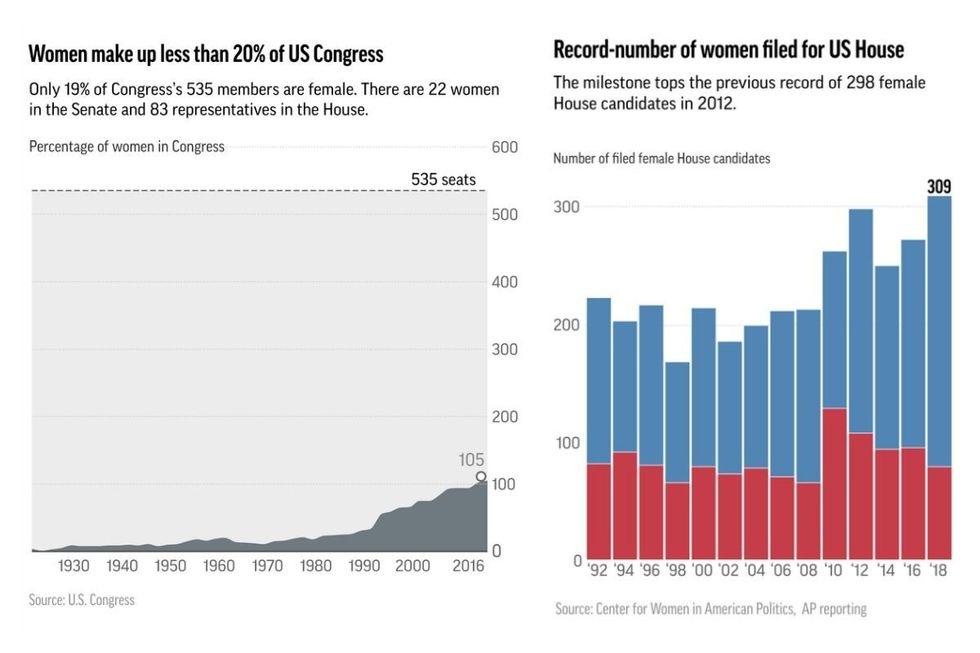Motivated in part by President Donald Trump's remarks and actions that have been widely preceived as attacks on women, a record number female candidates are running for the U.S. House this year--and the large majority of them are Democrats pushing for policies that aim to improve the lives of American women and families.
An Associated Press analysis published Thursday found that a total of 309 women have filed candidacy papers to run for the House, surpassing the record of 298 that was set in 2012. "Many of the female candidates," the report notes, "have focused their campaign messages on healthcare, education, early childhood development, family leave, and workplace equality."
That record-breaking number could grow before the midterm elections in November, according to the Center for American Women and Politics at Rutgers University, which found that more than 100 additional women are considering running for a House seat this year.
The center has also found notable interest in Senate and gubernatorial races: 29 women are running for Senate seats so far, and there are 28 other potential candidates; 40 women are running to serve as governor of their states, with another 39 potential candidates.
Among the first-time candidates for Congress this year is Kara Eastman, one of two Democrats running to unseat an incumbent Republican representative in Nebraska 2nd Congressional District.
Eastman told the Omaha World-Herald that she decided to run because she believes Trump is leading an "assault" on public education, environmental regulations, and healthcare. She supports Sen. Bernie Sanders's (I-Vt.) Medicare For All bill and is calling for federal legislation to address the national student debt and gun violence crises.
"If young women see other women running for political office, it can create the perception that this is not just possible, but also normal, appropriate, and important."
--Makana Chock, Syracuse University
Asked by the AP about the recent surge of female candidates--including many districts that have been dominated by men for decades--Eastman said, "It's about time."
"It's a great thing for me to show my 16-year-old daughter," she added, echoing research that suggests seeing more female candidates and politicians can encourage adolescent girls to become more politically engaged.
"If young women see other women running for political office, it can create the perception that this is not just possible, but also normal, appropriate, and important," explained Makana Chock, an associate professor of communications at Syracuse University, commenting on the candidacy of Dana Balter, a progressive running in New York's 24th District.
"Balter hasn't shied away from her work with the CNY Solidarity Coalition, a grassroots organization opposing President Donald Trump and his policies," Lianza Reyes pointed out in a column for The Daily Orange. "In a world where women are often told to suppress their emotions or opinions in exchange for respect, Balter's approach is refreshing and empowering for women following in her wake."
Ahead of the November midterm elections, in a special election on April 24 to replace former Rep. Trent Franks--who resigned in December following publicized sexual harassment allegations--voters in Arizona's 8th District will choose between two female candidates. Democrat Hiral Tipirneni, an emergency room doctor who moved from India to the United States at age 3, is a strong advocate for reproductive and immigrant rights.
Tipirneni has been endorsed by Indivisible and EMILY's List, which works to elect pro-choice women to political office. "This is a district that has never before elected a woman of color to Congress," noted EMILY's List president Stephanie Schriock, "and she is poised to be the first."





